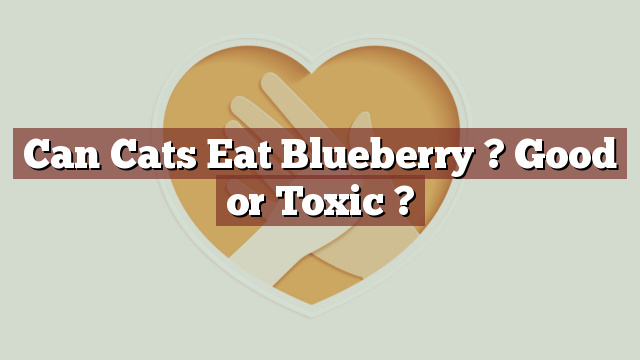Can Cats Eat Blueberries? Good or Toxic?
Knowing what foods are safe for our pets is essential to ensure their health and well-being. As cat owners, we often wonder if our feline friends can enjoy the same foods that we do. One food that frequently comes to mind is blueberries. Blueberries are known for their numerous health benefits in humans, but can cats safely eat blueberries, or are they toxic to them?
Nutritional Value of Blueberry: Vitamins, Antioxidants, and Fiber
Before we delve into whether cats can eat blueberries, let’s take a closer look at the nutritional value of these tiny fruits. Blueberries are packed with essential vitamins, antioxidants, and fiber. They are an excellent source of Vitamin C, which boosts the immune system and promotes overall health. Additionally, blueberries contain Vitamin K and manganese, which are beneficial for bone health and metabolism, respectively. The antioxidants found in blueberries can help reduce the risk of various diseases and support cognitive function.
Can Cats Safely Eat Blueberries or Are They Toxic?
Now, let’s address the burning question: can cats safely eat blueberries? The answer is yes. Blueberries are not toxic to cats and can be enjoyed by them in moderation. However, it’s important to note that cats are obligate carnivores, meaning their diet should primarily consist of meat. While fruits can provide some nutritional benefits, they should never replace a balanced feline diet.
Scientific and veterinary insights suggest that blueberries are safe for cats to consume. However, it’s crucial to remember that every cat is unique, and some may have specific dietary restrictions or sensitivities. It’s always a good idea to consult your veterinarian before introducing any new food to your cat’s diet.
Potential Risks and Benefits of Cats Consuming Blueberries
While blueberries are generally safe for cats, it’s important to be aware of potential risks and benefits. One risk is that blueberries can be a choking hazard, especially if they are not properly prepared. Ensure that the blueberries are washed thoroughly and cut into small, manageable pieces to minimize this risk.
On the other hand, the benefits of cats consuming blueberries can include improved digestion and weight management. The fiber content in blueberries can aid in regulating bowel movements and preventing constipation. Additionally, the low-calorie nature of blueberries makes them a suitable treat for overweight or obese cats.
What to Do if Your Cat Eats Blueberries: Monitor and Consult a Vet
If your curious feline manages to sneak a few blueberries, there is typically no need to panic. In most cases, consuming a small amount of blueberries should not cause any harm to your cat. However, it’s essential to monitor your cat for any signs of digestive upset, such as vomiting or diarrhea. If these symptoms persist or worsen, it is advisable to consult your veterinarian for further guidance.
Conclusion: Blueberries Can Be a Safe and Healthy Treat for Cats
In conclusion, blueberries can be a safe and healthy treat for cats when given in moderation. They offer a range of nutritional benefits and can be a tasty addition to your cat’s diet. However, it’s important to remember that blueberries should never replace a balanced feline diet that primarily consists of meat. Always consult your veterinarian before introducing any new food to your cat’s diet, as individual dietary needs may vary. By providing a well-rounded diet and monitoring your cat’s health, you can ensure that your furry friend stays happy and healthy.
Thank you for investing your time in exploring [page_title] on Can-Eat.org. Our goal is to provide readers like you with thorough and reliable information about various dietary topics. Each article, including [page_title], stems from diligent research and a passion for understanding the nuances of our food choices. We believe that knowledge is a vital step towards making informed and healthy decisions. However, while "[page_title]" sheds light on its specific topic, it's crucial to remember that everyone's body reacts differently to foods and dietary changes. What might be beneficial for one person could have different effects on another. Before you consider integrating suggestions or insights from "[page_title]" into your diet, it's always wise to consult with a nutritionist or healthcare professional. Their specialized knowledge ensures that you're making choices best suited to your individual health needs. As you navigate [page_title], be mindful of potential allergies, intolerances, or unique dietary requirements you may have. No singular article can capture the vast diversity of human health, and individualized guidance is invaluable. The content provided in [page_title] serves as a general guide. It is not, by any means, a substitute for personalized medical or nutritional advice. Your health should always be the top priority, and professional guidance is the best path forward. In your journey towards a balanced and nutritious lifestyle, we hope that [page_title] serves as a helpful stepping stone. Remember, informed decisions lead to healthier outcomes. Thank you for trusting Can-Eat.org. Continue exploring, learning, and prioritizing your health. Cheers to a well-informed and healthier future!

